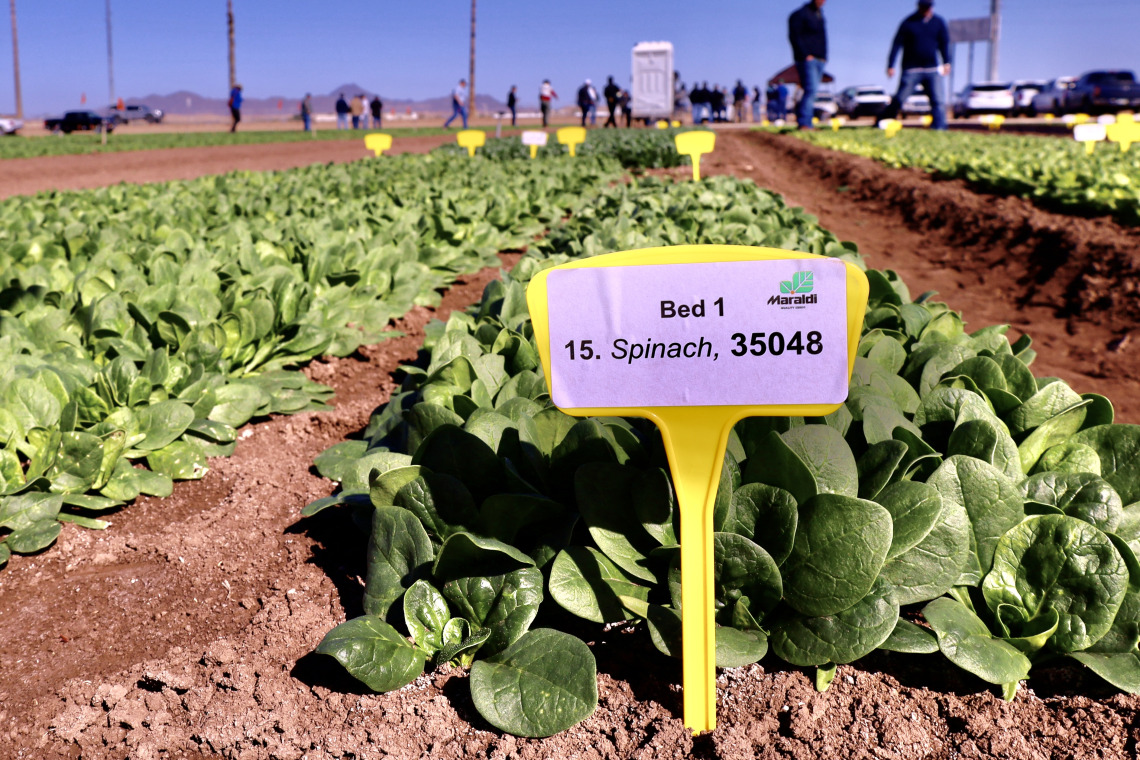UArizona Research in Yuma Helps Fight Global Spinach Nemesis
A spinach field trial is helping farmers and gardeners choose which varieties can withstand the threat of downy mildew disease.

This 1-acre plot at University of Arizona's Yuma Agricultural Center is helping spinach growers decide which varieties to plant this year.
(YUMA, Ariz.) - Cooperative Extension researchers and agriculture industry representatives gathered in a Yuma Valley field recently to help regional growers – and backyard gardeners - fight a global blight on spinach and decide what to plant this year.
“Downy mildew disease is a big problem worldwide,” said James Correll, a University of Arkansas plant pathology professor who hosted the field day with Arizona Extension plant pathologist Bindu Poudel-Ward.
This week’s event and an underlying field trial help Arizona and California growers and gardeners find spinach varieties genetically predisposed to resist the disease caused by the fungus Peronospora farinosa f. sp. spinaciae, Correll said.
The fungus spreads on the wind and can render crops unfit for your dinner table.
“There are different strains that come out every year, so breeders are continually trying to fight the disease. We do a lot of greenhouse testing with these strains of the pathogen, but that’s not the same as doing a real-world trial,” he said.
The Yuma field trial mimics conditions in gardens and farm fields in a way greenhouse trials can’t, because the crops are exposed to the same pathogens that will blow onto crops. The test plots show which varieties resist this years’ prevalent downy mildew.
The spinach trial includes 70 varieties growing under identical conditions with equal irrigation and pesticide treatment. During the two-hour field day, growers and seed company reps wandered from section to section on the 1-acre plot checking the three-inch plants for signs of disease, which include yellow lesions on the top of leaves and purple fungal growth on the undersides.
Different varieties do well in different years, depending on which strains of the disease are circulating. The trial hints at which ones will do well this year, while also giving seed companies – who normally only do trials of their own varieties – a chance to see how competitors’ varieties fare, Correll said.
Day to day, the trial is managed by the Yuma Plant Health Clinic, an Extension lab specializing in testing for and diagnosing fungi, bacteria, and viruses in vegetables, ornamentals, trees, and field crops for growers and home gardeners.
Poudel-Ward, the clinic’s principal investigator, has tracked the spinach from the start, recording metrics including color, growth rate, and yield, data that Extension also collects in fungicide trials on lettuce, melons and tomatoes looking for fusarium wilt, powdery and downy mildew, and sclerotinia drop.
“All of the information is available not only to (growers and seed companies), but also to the public,” Poudel-Ward said.
The Yuma work also helps inform the global response to plant diseases. A downy mildew working group in the Netherlands connects scientists like Poudel-ward and Correll to others in South America and Europe.
“It gives us an idea of the enemy, the pathogen, and how to combat it,” Correll said.
The spinach field trial is housed at the Yuma Agricultural Center, a 274-acre applied research center staffed by Extension employees and faculty from the departments of Plant Sciences, Entomology, and Agricultural and Biosystems Engineering.
Research and Extension programs at the center include plant physiology, crop production, insect biology and control, disease biology and control, weed ecology, soil and water management, fate and transport of environmental contaminants, food safety, and agricultural mechanization.
